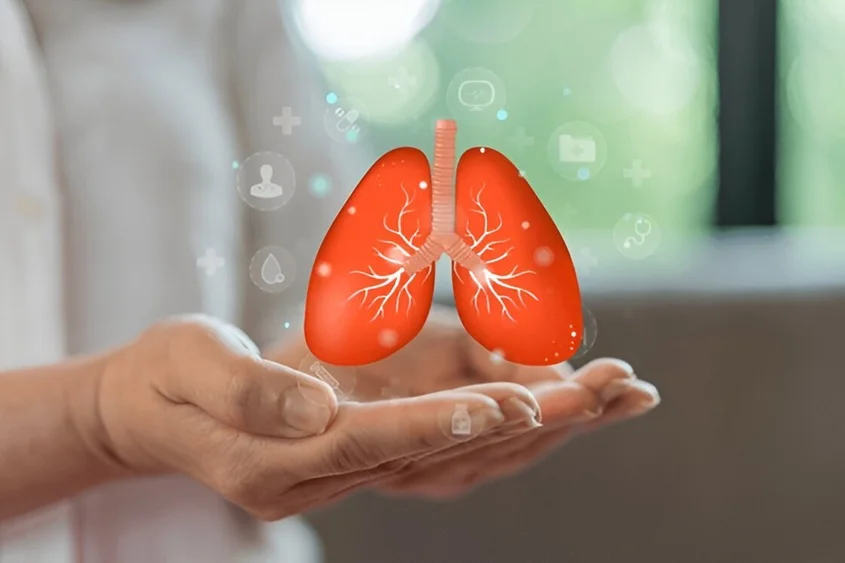How to Keep Your Lungs Healthy: Simple Tips for Better Breathing
- Updated on: Mar 26, 2025
- 4 min Read
- Published on Mar 25, 2025

When we talk about overall health, one of the most important but often overlooked aspects is lung health. Our lungs play a vital role in keeping our bodies filled with oxygen, thereby supporting every cell. However, due to rising air pollution, smoking, and unhealthy lifestyle choices, our lungs can become vulnerable to damage. In this blog post, we will discuss why lung health matters, common threats to respiratory health, and practical tips to improve lung function.
Why Lung Health is Important
Our lungs are essential for survival, enabling the exchange of oxygen and carbon dioxide. Oxygen enters the body through the lungs, providing fuel to every organ and tissue. The respiratory system also helps expel toxins and waste gases, keeping us healthy. Keeping our lungs in top shape is important for breathing comfortably and overall health and vitality.
Healthy lungs ensure that you:
- Breathe freely and without discomfort
- Improve stamina and physical performance
- Keep your immune system strong
- Prevent chronic respiratory conditions
Common Risks to Lung Health
Many factors threaten lung health, often without our realizing it. Here are some of the most common causes:
Air Pollution and Lungs
Air pollution is one of the major causes of lung damage. Fine particles (PM2.5) emitted by vehicles, factories, and forest fires can enter the lungs, causing inflammation and increasing the risk of respiratory diseases such as asthma and chronic obstructive pulmonary disease (COPD).
Smoking Effects on Lungs
Smoking is by far the most harmful habit for your lungs. Cigarettes contain toxins that can inflame and damage lung tissue, leading to conditions such as emphysema, bronchitis, and even lung cancer. Secondhand smoke is just as dangerous, so avoiding environments where people smoke is important to protect your lungs.
Poor Diet and Lifestyle Choices
A poor diet rich in processed foods can have an indirect effect on lung health. Inadequate nutrition, combined with a sedentary lifestyle, can lead to obesity, which puts extra pressure on your lungs, making breathing more difficult.
Lung Disease Prevention
Genetic factors and a history of respiratory infections can also increase susceptibility to lung diseases. Early detection and regular screening can go a long way in preventing major complications.
Best Practices to Improve Lung Health
Maintaining healthy lungs requires a combination of healthy habits, environmental awareness, and regular monitoring. Here are some effective practices you can adopt to support your lung health:
Avoid Smoking and Secondhand Smoke
This makes no sense—smoking is the number one cause of lung disease. Quitting not only stops further damage but also allows your lungs to begin to repair themselves. If you don’t smoke, avoid areas with secondhand smoke to protect your lungs.
Practice Breathing Exercises
Exercises such as diaphragm breathing can help improve lung capacity and oxygen intake. These exercises strengthen the diaphragm and improve overall lung functioning.
Top Breathing Exercises for Lung Health:
Pursed Lip Breathing
Breathe in through your nose for two counts, purse your lips as if blowing through a straw, and exhale slowly.
Deep Breathing
Inhale deeply through your nose for a count of four, hold for four seconds, and then exhale through your mouth for six seconds.
Clean Air at Home
It is very important to reduce air pollution in your home environment. Invest in an air purifier, avoid smoking indoors, and ensure proper ventilation. Also, avoid using toxic cleaning chemicals that can irritate the lungs.
Stay Active
Exercise is not only good for your body, but it also promotes better lung health. Regular physical activity helps improve lung capacity and strengthen the muscles that assist in breathing.
Lung Detox
Lung detox involves removing toxins and chemicals that have accumulated in your lungs due to air pollution, smoking, or a poor lifestyle. Drinking plenty of water, inhaling steam, and consuming antioxidants can help cleanse the lungs.
The Role of CPAP and BiPAP Machines in Better Breathing
If you or someone you know is dealing with respiratory conditions like sleep apnea, using a CPAP or BiPAP machine can significantly improve lung health by ensuring adequate oxygen supply during sleep.
BiPAP and CPAP machines provide continuous airflow, helping
individuals with obstructive sleep apnea and other respiratory issues breathe easier and prevent the long-term damage caused by untreated conditions. These devices help maintain the necessary oxygen levels, promote deeper sleep, and reduce daytime fatigue.
To learn more about these machines, especially their innovative features like auto-mask detection, check out our detailed blog What is the Auto-Mask Detection Feature in CPAP and BiPAP Machines?
Best Foods for Lung Health
Eating a balanced diet filled with nutrient-dense foods is essential for maintaining good lung health. Here are some of the best foods for lung health:
- Leafy Greens: Rich in antioxidants, helps reduce lung inflammation.
- Berries: High in vitamin C, protect against lung damage.
- Garlic: Known to help reduce lung inflammation and fight respiratory infections.
- Turmeric: Contains curcumin, an anti-inflammatory compound that benefits lung health.
- Salmon: High in omega-3 fatty acids, supports lung function.
- Ginger: Reduces airway inflammation and promotes healthy lungs.
Exercises & Lifestyle Changes for Better Lung Health
Maintaining a healthy lifestyle is key to supporting lung health. Here are some effective changes you can incorporate:
Cardiovascular Exercise
Cardio exercises such as walking, running, cycling, and swimming increase lung capacity and functionality. These exercises improve oxygen intake and help flush out toxins from the lungs.
Yoga and Pilates
Yoga and Pilates focus on deep breathing and posture, which improves lung function. They also help with relaxation by reducing stress on your lungs.
Weight Management
Excess weight can put extra pressure on your lungs. By maintaining a healthy weight through diet and exercise, you can improve your lung capacity and breathing ability.
Conclusion
Your lungs play a vital role in your overall well-being, and taking care of them should be a priority. By quitting smoking, practicing breathing exercises, maintaining a balanced diet, and staying active, you can significantly improve lung function and overall respiratory health. Additionally, for those with conditions like sleep apnea, using CPAP or BiPAP machines can support better breathing and oxygen intake during sleep.
Small, consistent changes can lead to long-term benefits. Start prioritizing your lung health today and breathe easier for a healthier future!












